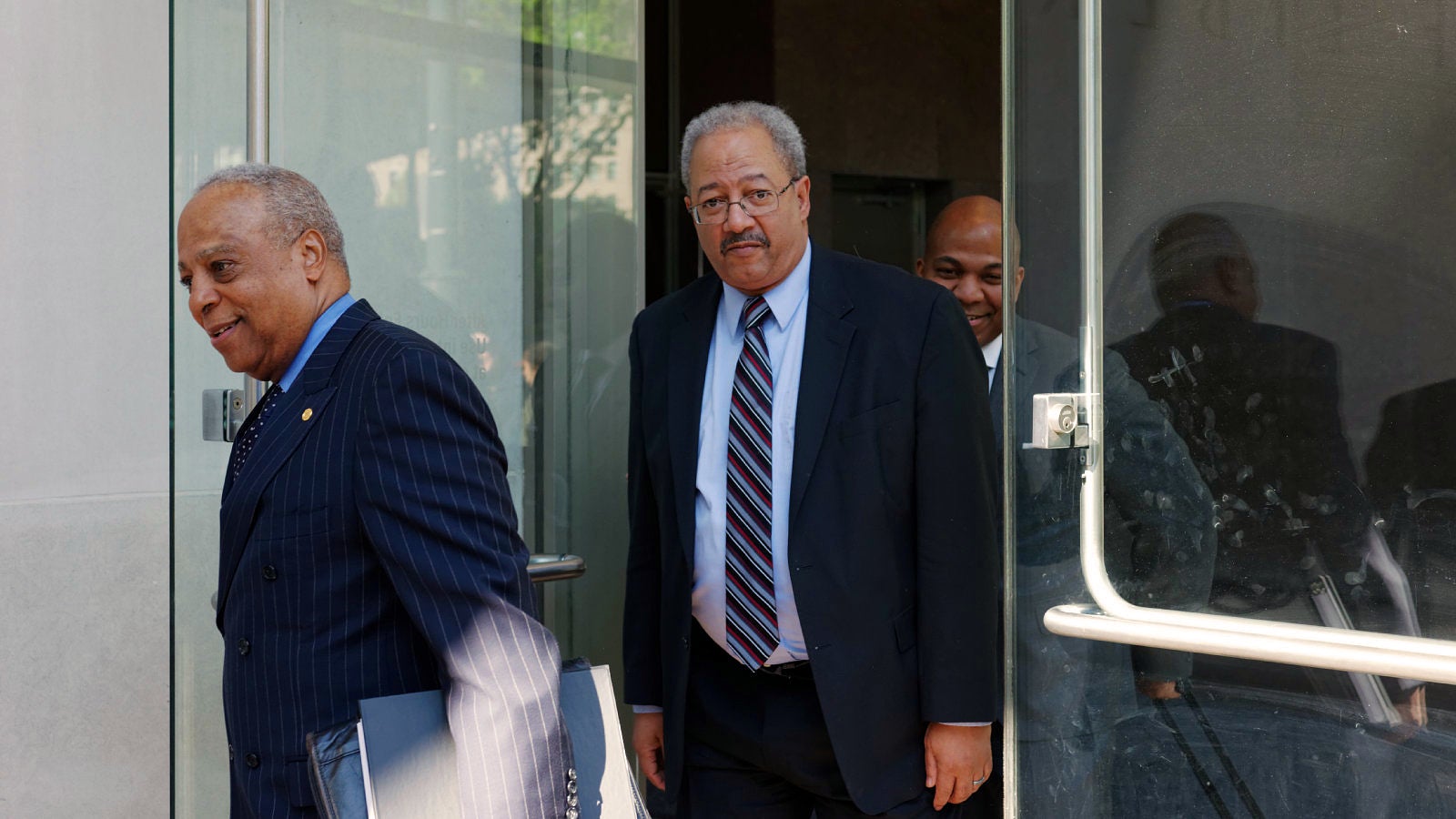Closing arguments continue in Fattah case

Closing arguments continue Tuesday in the federal corruption trial of U.S. Rep. Chaka Fattah. (Bastiaan Slabbers for NewsWorks)
During its opening statement last month, the government meticulously detailed the crimes laid out in the federal indictment facing U.S. Rep. Chaka Fattah and four co-defendants.
It was a bit on the dry side.
Its closing argument on Monday was different. For nearly three hours, Assistant U.S. Attorney Jonathan Kravis used colorful and, at times, blistering language while accusing Fattah of quarterbacking a “white-collar crime spree” that could imprison one of the city’s longest-serving congressmen for years if he’s convicted.
“Congressman Fattah repeatedly abused his office for personal and political gain,” Kravis told jurors. “But he did not do it alone.”
Most of the morning was devoted to allegations that Fattah took an illegal $1 million loan for his failed bid for Philadelphia mayor in 2007, then orchestrated the theft of federal grants and charitable donations to repay part of the loan.
The loan, which exceeded the city’s newly minted campaign finance limits, was made just weeks before the Democratic primary with hopes of Fattah regaining the front-runner status he enjoyed when he entered the race, according to testimony.
Kravis retraced how $600,000 of the loan was repaid by allegedly funneling funds through a for-profit and nonprofit organization and further covered using falsified or sham documents, including campaign finance reports and business contracts.
Over and over, Kravis urged the jury to use common sense while considering the facts.
“Turns out, it’s kind of hard to hide $600,000,” he said.
Kravis saved his most pointed barbs for the end, while discussing allegations that, for years, Fattah accepted bribes from co-defendant Herbert Vederman, a wealthy friend who wanted to become a U.S. ambassador.
“This one takes the cake,” he told jurors.
Vederman allegedly provided Fattah and his wife with $18,000 to help them close on a house in the Poconos. Prosecutors said the bribe was then covered up with a sham car sale.
The government also alleged that Vederman gave Fattah nearly $6,000 to help cover the congressman’s city wage taxes and college tuition for an au pair.
In exchange, prosecutors said, Fattah sent letters to U.S. Sen. Bob Casey and Obama administration staffers extolling Vederman’s resume, including his years in public service.
“Fattah put up that public trust for sale and Vederman bought it,” said Kravis.
“In the end,” he added, “he found himself a bought-and-paid for congressman.”
Fattah, who maintains his innocence, grinned at times while listening to the government.
Prosecutors also allege that the congressman used campaign cash to help pay off some of his son’s college loan debt, and that he aimed to steer federal grants to a fake nonprofit to settle up with a political consultant.
Fattah attorney: ‘No credible’ evidence
Samuel Silver, one of Fattah’s lawyers, argued in his closing that the government presented “no credible” evidence tying Fattah to the illegal activities presented at trial, and that it had “utterly failed” to fulfill its burden of proof.
“Mr. Kravis called it a white-collar crime spree. I call it a smear,” said Silver. “They throw a lot at the wall to make this look dastardly.”
Silver told jurors there was nothing illegal about the relationship Fattah had with Vederman. Ditto for his connection to the illegal $1 million loan, which Silver argued was very limited.
“It’s not a crime to give the name of a wealthy and influential person,” said Silver.
Prosecutors allege that former Sallie Mae CEO Alfred Lord loaned the Fattah campaign the $1 million.
Silver also took pains to try to undermine the government’s key witnesses: Thomas Lindenfeld and Gregory Naylor. The political operatives, who both worked on Fattah’s mayoral campaign, pleaded guilty before trial.
Both testified that Fattah knew about the loan from Lord and how it was repaid.
Silver called Lindenfeld a “sworn perjurer” with an ax to grind over unpaid campaign work, and emphasized that both men have hopes of getting a lenient sentence from the government in exchange for their cooperation, especially during trial.
Kravis told the jurors that the government wasn’t “asking you to like” Lindenfeld and Naylor, only understand that they were the ones “in the best position … because they are on in the inside.”
During her closing argument, Catherine Recker, one of Vederman’s lawyers, said the government had “cherry-picked” facts and documents to create a case against her client.
She said Vederman and Fattah’s relationship was never guided by bribery, but “friendship and political support.”
Part of her proof: The sham car sale the government alleges has a paper trail. Why would someone bribing a politician do that?
“Friends do things for one another,” said Recker. “The government’s theory won’t allow for politicians to have friends. It’s an awfully cynical view.”
Also charged under the indictment are Bonnie Bowser, a former chief of staff at Fattah’s congressional office in Philadelphia; Karen Nicholas, a former congressional staffer and CEO of the Educational Advancement Alliance, a nonprofit Fattah founded; and Robert Brand, founder of the for-profit organization Solutions for Progress.
Nicholas is accused of obtaining a $50,000 federal grant for an already-held education conference, then using the cash on herself and Naylor.
Closing arguments are expected to resume Tuesday. The government will also have the opportunity to present a rebuttal before jurors begin deliberating.
WHYY is your source for fact-based, in-depth journalism and information. As a nonprofit organization, we rely on financial support from readers like you. Please give today.


